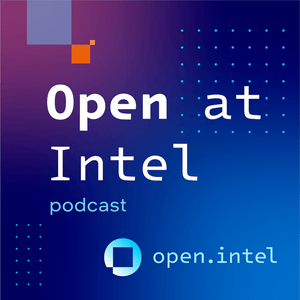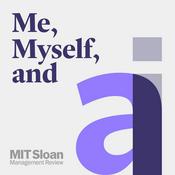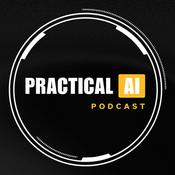103 episodios

Building Innovation with Open Source AI
05/6/2025 | 24 min
In this episode, we hear from Melissa McKay, Head of Developer Relations, who discusses her involvement in open source communities, especially Jenkins and OPEA. She highlights the significance of AI in today's technology landscape, touching on its increasing prevalence and integration into various processes. The discussion also covers the challenges and opportunities AI brings, including security concerns and the need for standardization through projects like the Open Platform for Enterprise AI (OPEA). Melissa provides insights into learning and adapting to new technological trends, emphasizing the importance of having a safe environment for experimentation and continuous learning. 00:00 Introduction and Welcome 02:39 Involvement with Jenkins and Community Support 03:58 AI and Its Growing Impact 07:52 Challenges and Security in AI 09:24 Adapting to New Technologies 21:06 Encouragement for Community Involvement Guest: Melissa McKay is passionate about Java, DevOps and Continuous Delivery. She is currently Head of Developer Relations for JFrog and a member of the Technical Steering Committee of the Open Platform for Enterprise AI (OPEA). Melissa has been recognized as a Java Champion and a Docker Captain, is an international speaker, and is co-author of the O'Reilly title, DevOps Tools for Java Developers.

Democratizing Kubernetes for AI and ML with Kubeflow
29/5/2025 | 20 min
In this episode, we hear from Andrey Velichkevich, a key contributor to the Kubeflow project, an ecosystem of open source projects to streamline the AI and ML lifecycle on Kubernetes. Andrey shares his extensive experience with the project, explains the various components and their use cases, and discusses the community's focus on accessibility and collaboration. They cover the project's evolution, the unique challenges and solutions offered, and the importance of engaging new contributors through initiatives like Google Summer of Code. The conversation highlights the future roadmap for Kubeflow, the significance of cross-project collaboration, and the key to creating a supportive and rewarding contributor environment. 00:00 Introduction and Greetings 00:14 Overview of the Kubeflow Project 01:20 Kubeflow's Ecosystem and Components 02:54 Target Audience and Use Cases 05:12 Future Roadmap and Goals 09:38 Community Engagement and Contributions 19:09 Conclusion and Final Thoughts Guest: Andrey Velichkevich is a member of Kubeflow Steering Committee and a co-chair of Kubeflow AutoML and Training WG. Additionally, Andrey is an active member of the CNCF WG AI. He is one of the authors of the CNCF AI white paper and he is helping with various AI initiatives from the CNCF community.

AI Agents and Developer Evolution: Bridging Human and Machine
28/5/2025 | 24 min
In this episode, we hear from Janikiram MSV, an industry analyst and advisor based in Hyderabad, India, who specializes in AI agents and cloud native technology. We spoke about the evolution of AI agents, from chatbots to personalized AI assistants, and their advancement to AI agents that can access data, utilize APIs, and perform tasks autonomously. The discussion also covers the impact of these technologies on various fields, especially for developers, through examples like app modernization and AI-driven tools. We address important considerations such as authentication, authorization, and the future role of junior developers in an AI-augmented world. This episode sheds light on how AI agents can significantly transform workflow efficiency across multiple domains. 00:00 Introduction 00:56 Evolution of AI Agents 06:10 Impact on Developers and IT Operations 07:17 Authentication and Authorization Challenges 09:41 Future of AI in Development 20:19 Advice for Junior Developers 22:23 Conclusion and Future Discussions Guest: Janakiram MSV is an an industry analyst, strategic advisor, and a practicing architect. Through his speaking, writing, and analysis, he helps businesses take advantage of emerging technologies.

Challenges and Triumphs in Kubernetes Security
22/5/2025 | 23 min
In this episode recorded at KubeCon in London, Cailyn Edwards, a security engineer at Okta, shares her unique journey from a rough guide and farmer to a security professional. Based in Canada, she discusses her dual life of securing platforms in her day job and co-chairing Kubernetes SIG Security in her community role. Cailyn emphasizes the importance of diverse backgrounds in the security field for better risk evaluation and shares tips on entering this realm, regardless of one's starting point. The conversation also touches on challenges like open source sustainability, economic pressures, and leveraging AI in coding, along with practical advice for new contributors to cloud-native technologies. 00:00 Welcome 00:31 Meet Kaylin: From Farmer to Security Engineer 03:35 The Importance of Diverse Perspectives in Security Risk Assessment 05:07 Understanding SIG Security in Kubernetes 09:24 Challenges in Open Source Contributions 17:03 Identity and Security in the Cloud Native World 21:35 Final Thoughts

Flatcar Linux: Made for Containers
15/5/2025 | 22 min
In this episode, Danielle Tal and Thilo Fromm join us to discuss Flatcar Linux. They introduce Flatcar as a Linux operating system designed specifically for containers and Kubernetes workloads, highlighting its automation, self-healing capabilities, and security features. They emphasize how Flatcar simplifies operations for startups and large companies alike by automating OS provisioning and maintenance. We discussed contributor engagement and the project's involvement with the CNCF. They also share intriguing use cases, like a Kubernetes cluster running on a tractor fleet, and stress the importance of community contributions, not just in code but in evangelism and documentation. 00:00 Introduction 01:05 What is Flatcar? 02:01 Flatcar's Automation and Self-Healing Capabilities 04:10 User Experience and Testing 05:06 Ideal Users and Use Cases 10:36 Community and Contributions 13:38 Getting Started with Contributions 16:59 Impact and Future Directions 19:58 Conclusion and Final Thoughts Guest: Danielle Tal is a Program Manager at Microsoft and an integral part of the team responsible for maintaining Flatcar Container Linux. The team is contributes to Linux OS distributions and Linux Security within Azure and other upstream projects. With a background in supporting diverse enterprise cloud applications as a support engineer, Danielle has transitioned into a management role, overseeing Docker EMEA support before joining the Flatcar team. Thilo Fromm is an engineering manager and works on Community Linux distributions and Linux Security at Azure. Thilo's team helps maintaining Flatcar Container Linux. He has given talks at FOSDEM, FrOSCon, KubeCon, Open Source Summit, Cloud-Native Rejekts, and various meetups like Kubernetes Community Days. Thilo started his career in embedded systems with hardware design and roll-your-own /from scratch embedded Linux, kernel and plumbing level development, and later virtualisation. After working for various cloud providers in engineering and management positions, he went full cloud native in 2019. Nowadays Thilo works on operating systems for cloud-native environments with a special focus on Flatcar Container Linux.
Más podcasts de Tecnología
Podcasts a la moda de Tecnología
Acerca de Open at Intel
Escucha Open at Intel, Topes de Gama Unplugged y muchos más podcasts de todo el mundo con la aplicación de radio.net

Descarga la app gratuita: radio.net
- Añadir radios y podcasts a favoritos
- Transmisión por Wi-Fi y Bluetooth
- Carplay & Android Auto compatible
- Muchas otras funciones de la app
Descarga la app gratuita: radio.net
- Añadir radios y podcasts a favoritos
- Transmisión por Wi-Fi y Bluetooth
- Carplay & Android Auto compatible
- Muchas otras funciones de la app


Open at Intel
Descarga la app,
Escucha.


































